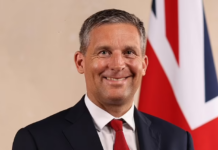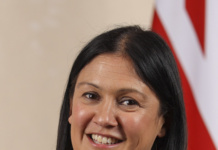Eton-educated Zac Goldsmith talks affordable housing, state schools and mini-cabs
African Voice caught up with Zac Goldsmith the Conservative candidate for the 2016 London mayoral elections on 21st January. Mr Goldsmith had something to say hot off the press regarding the housing shortage in London.
AFRICAN VOICE: Talk about the launch of your campaign and what London needs for all of London.
The boom in London over the past 8 years, which can be credited to Boris Johnson, who put London back on the map, which can be seen in the activities and the rate housing has exploded. But though there is a boom in the economy of London, a lot of people feel that this has not affected their lives, as they haven’t boomed like the economy.
People feel considerably that they have been priced out of their own city; most obvious example of that being housing that you could be earning double an average salary and you can’t afford to own your own property in London. That’s a social problem, it’s an ethical problem, and it is a business problem.
You can’t afford to live in the city where you work, then you are probably not going to stay there for long. That is a real big cause for concern. That is why this plan puts housing at the top of the list of priorities, but it’s not just housing but also transport as well. And the reason transport is so important is because growing a transport network allows us to open up the land to build the homes. If you don’t open up the transport networks then you don’t open up the land you need to build the homes. The land will help to solve the housing crisis. Environment has become one of the key concerns for people wherever they live.
As a mayoral candidate, I will say this that if you want to deliver for London then you need to get a good deal from government. It is very important. We generate huge wealth in this capital and it is all to the government. At least 93% of it goes to the government. We then have to beg for some of that back to pay for our police, our housing, our transport etc.
So if you want to improve London and be a successful mayor then we have to be prepared to hold government to account when they get it wrong, but to also get a good deal from government. And my record as MP shows that I’ve done that in the past five years, I’ve held government to account where they’ve got it wrong. I’ve stopped them and I’ve said so and I’ve also delivered for my constituents and that’s what I want to do for the whole of London. I think that’s what marks me out as a candidate for this job. I’ve got a record of working with this government, whereas my rivals – particularly my labour rival – has shown no ability or willingness to engage with people outside of his political party throughout his political career.
AFRICAN VOICE: Let me start by asking you what would you be doing differently to Boris Johnson to engage with the different communities that make London up?
London is one of the most diverse cities on earth and also the greatest city on earth. The two go hand in hand. It is not because it has such diversity but also harmony and it is this diversity that makes it a great city. The harmony that exists between the communities in London does not happen anywhere else in the world. Our communities generally do not have the same tension that you get in other parts of the world. For anyone who doubts the value of diversity in London, you only have to strip the diversity in London to see how it will strictly be a pale imitation of what is now.
As a mayoral candidate but also as a citizen of the city, I am speaking for, standing up for and representing everyone in our city no matter what their background is.
Whether you are families from Nigeria, Pakistani, Israel or wherever, you have the same concern. Are your kids going to get a good education? Are you safe when you walk the streets? Are the police going to be there when you need them? Can you afford to get on the housing ladder? These are concerns that affect everyone right across all the communities. I don’t want to speak for one diverse community. I want to speak for London as a whole.
Whether you are families from Nigeria, Pakistani, Israel or wherever, you have the same concern. Are your kids going to get a good education? Are you safe when you walk the streets? Are the police going to be there when you need them? Can you afford to get on the housing ladder? These are concerns that affect everyone right across all the communities. I don’t want to speak for one diverse community. I want to speak for London as a whole.
AFRICAN VOICE: Many people in the capital prefer to send their wards to private or catholic schools as opposed to state schools. State schools are still the third choice. What would you be doing to raise the target?
I think that is beginning to change because of the policy brought in by the last government, particularly policies surrounding academies, has started to help them to change. Free school programmes have raised the quality and standards of its schools. People are sending their kids to state schools where they have the ability to do so because there are great schools within their areas.
People do not want to go to an unnecessary expense, so the challenge is to make sure that lands that could lend themselves to being the alternative for new schools are not just sold off to developers. The main issue in terms of schools in London today is capacity. There is more and more demand for new schools at secondary level and at primary level and I think that is where our priorities should lie. The responsibility of the mayoral candidate is to ensure that you don’t give away the good land delegated for new schools.
AFRICAN VOICE: You’ve been quoted as promising a solar revolution in London, how will that affect the green fields?
One of the biggest obstacles we are seeing in London today is the amount of homes that are bought by the public but are not used. One of the things I want to say to Londoners is that if they see a publicly owned roof space that is free for use; if it is not being used for anything else, then it can be used free of charge. This is working quite well in Bristol. It’s a new policy.
AFRICAN VOICE: The government has promised to cut the subsidies solar incentives, how would you fund that?
I’ve been the strongest advocate for environmental health policy in the past 5 years. Solar subsidies, because the cost of production has come down so dramatically, have to keep coming down. You don’t want to create a facility where putting up solar panels is a license to print cash.
AFRICAN VOICE: The Uber cars… Black cabs are complaining about Uber taking their business?
I worry about black cabs; I think they are an important part of London. I think it would be sad if London lost them. I think they are in an unfair competition with Uber cars. There are things that the black cabs can do that Uber are not licenced to do. There needs to a distinction between the two as they are not necessarily providing the same quality of service.
AFRICAN VOICE: Have you had a change of mind with regards to Heathrow extension?
Heathrow expansion would be a backward step if you want competition in the sector – and you do. Competition not monopoly.









